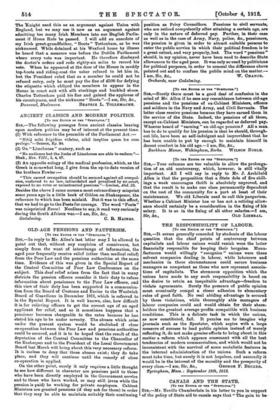THE RESPONSIBILITY OF LABOUR.
[TO THE EDITOR OP THE " SPECTATOR."] Six,—It seems generally conceded by students of the labour question that the chief points of controversy between capitalists and labour unions would vanish were the latter financially responsible for keeping their bargains. Mann. facturers would willingly " recognize " unions were these solvent companies dealing in labour, while labourers and mechanics in these circumstances could secure business managers as competent as those who now represent associa- tions of capitalists. The strenuous opposition which the unions have made to any such responsibility is based on the desire to retain an inequitable advantage—freedom to violate agreements. Surely the pressure of public opinion must eventually compel a closer adhesion to elementary rules of good faith. No real abiding advantage is secured by these violations, while thoroughly able managers of labour companies could and would obtain for their share- holders the greatest average profits compatible with business conditions. This is a delicate task in which the unions, as now constituted, fail. It puzzles me to imagine why journals such as the Spectator, which aspire with a large measure of success to lead public opinion instead of merely reflecting it, do not make greater efforts to bring about in this matter a reform which appears consonant with all the best tendencies of modern commercialism, and which would not be inconsistent with the survival of some socialistic features in the internal administration of the unions. Such a reform must take time, but surely it is not hopeless, and assuredly it would be in the interest of the morality and the prosperity of


































































 Previous page
Previous page